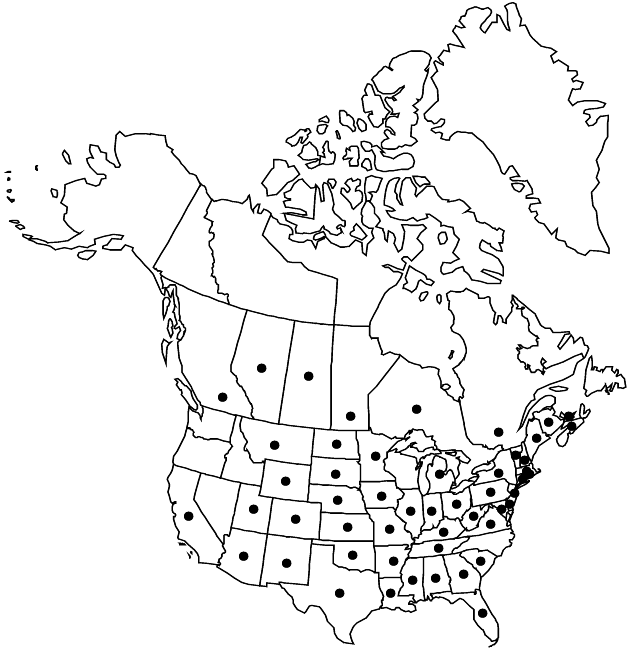Difference between revisions of "Solidago altissima"
Sp. Pl. 2: 878. 1753.
FNA>Volume Importer |
RevisionBot (talk | contribs) m (Bot: Adding category Revised Since Print) |
||
| (7 intermediate revisions by 3 users not shown) | |||
| Line 20: | Line 20: | ||
-->{{Treatment/Body | -->{{Treatment/Body | ||
| − | |distribution= | + | |distribution=Alta.;B.C.;Man.;N.B.;N.S.;Ont.;P.E.I.;Que.;Sask.;Ala.;Ariz.;Ark.;Calif.;Colo.;Conn.;Del.;Fla.;Ga.;Ill.;Ind.;Iowa;Kans.;Ky.;La.;Maine;Mass.;Md.;Mich.;Minn.;Miss.;Mo.;Mont.;N.Dak.;N.H.;N.J.;N.Mex.;N.Y.;Nebr.;Ohio;Okla.;Pa.;R.I.;S.C.;S.Dak.;Tenn.;Tex.;Utah;Va.;Vt.;W.Va.;Wyo.;Mexico;introduced worldwide. |
|discussion=<p>Subspecies 2 (2 in the flora).</p> | |discussion=<p>Subspecies 2 (2 in the flora).</p> | ||
|tables= | |tables= | ||
| Line 44: | Line 44: | ||
-->{{#Taxon: | -->{{#Taxon: | ||
name=Solidago altissima | name=Solidago altissima | ||
| − | |||
|authority=Linnaeus | |authority=Linnaeus | ||
|rank=species | |rank=species | ||
| Line 51: | Line 50: | ||
|basionyms= | |basionyms= | ||
|family=Asteraceae | |family=Asteraceae | ||
| − | |distribution= | + | |distribution=Alta.;B.C.;Man.;N.B.;N.S.;Ont.;P.E.I.;Que.;Sask.;Ala.;Ariz.;Ark.;Calif.;Colo.;Conn.;Del.;Fla.;Ga.;Ill.;Ind.;Iowa;Kans.;Ky.;La.;Maine;Mass.;Md.;Mich.;Minn.;Miss.;Mo.;Mont.;N.Dak.;N.H.;N.J.;N.Mex.;N.Y.;Nebr.;Ohio;Okla.;Pa.;R.I.;S.C.;S.Dak.;Tenn.;Tex.;Utah;Va.;Vt.;W.Va.;Wyo.;Mexico;introduced worldwide. |
|reference=None | |reference=None | ||
|publication title=Sp. Pl. | |publication title=Sp. Pl. | ||
|publication year=1753 | |publication year=1753 | ||
|special status= | |special status= | ||
| − | |source xml=https:// | + | |source xml=https://bitbucket.org/aafc-mbb/fna-data-curation/src/2e0870ddd59836b60bcf96646a41e87ea5a5943a/coarse_grained_fna_xml/V19-20-21/V20_328.xml |
|tribe=Asteraceae tribe Astereae | |tribe=Asteraceae tribe Astereae | ||
|genus=Solidago | |genus=Solidago | ||
| Line 64: | Line 63: | ||
}}<!-- | }}<!-- | ||
| − | -->[[Category:Treatment]][[Category:Solidago subsect. Triplinerviae]] | + | --> |
| + | |||
| + | [[Category:Treatment]] | ||
| + | [[Category:Solidago subsect. Triplinerviae]] | ||
| + | [[Category:Revised Since Print]] | ||
Latest revision as of 18:32, 6 November 2020
Plants 50–200 cm; rhizomes short- to long-creeping. Stems 1–40+, usually short-hairy throughout, sometimes proximally glabrescent. Leaves: basal 0; proximal cauline usually withering by flowering; sessile or subpetiolate, tapering to bases; blades oblanceolate, 95–150 × 16–20 mm, relatively thick and firm, entire to serrate along distal 1/2, strongly 3-nerved, apices acute to acuminate, abaxial faces finely strigose, more so along nerves, adaxial ± scabrous; mid to distal cauline blades oblanceolate (proximally) to lanceolate (distally), mid (30–)45–100(–170) × (5–)7–16(–25) mm, much reduced distally [(15–)25–55 × (3–)4.5–10(–17) mm], margins finely serrate (teeth 0–6(–14) per side on mid), distally usually becoming entire or remotely serrulate, adaxial faces ± scabrous, abaxial moderately strigillose, densely villoso-strigillose along nerves, distal sometimes minutely stipitate-glandular. Heads (15–)100–1200+, secund, in secund, pyramidal, paniculiform arrays, branches divergent and recurved, sometimes ascending-divergent, sometimes merely club-shaped thyrsiform in small plants, 5–30 × 2–25 cm (often 1.5–2 times as long as wide in southern plants). Peduncles 1–3.5 mm, moderately densely short hispiduloso-strigillose, sometimes minutely stipitate-glandular; bracteoles linear, sometimes minutely stipitate-glandular. Involucres narrowly campanulate, 2.5–4.5 mm. Phyllaries in ca. 3 series, strongly unequal; outer lanceolate, acute, inner linear-lanceolate, margins rarely minutely stipitate-glandular, apices acute to obtuse. Ray florets (5–)8–13(–17); laminae 0.7–1.5(–2) × 0.1–0.4(–0.5) mm. Disc florets (2–)3–6(–9); corollas usually 2.3–3.6 mm, lobes 0.5–0.9(–1.2) mm. Cypselae (narrowly obconic) 0.5–1.5 mm, sparsely to moderately strigillose; pappi 2.5–3.5 mm.
Distribution

Alta., B.C., Man., N.B., N.S., Ont., P.E.I., Que., Sask., Ala., Ariz., Ark., Calif., Colo., Conn., Del., Fla., Ga., Ill., Ind., Iowa, Kans., Ky., La., Maine, Mass., Md., Mich., Minn., Miss., Mo., Mont., N.Dak., N.H., N.J., N.Mex., N.Y., Nebr., Ohio, Okla., Pa., R.I., S.C., S.Dak., Tenn., Tex., Utah, Va., Vt., W.Va., Wyo., Mexico, introduced worldwide.
Discussion
Subspecies 2 (2 in the flora).
Selected References
None.
Key
| 1 | Involucres usually 3–4 mm; Arizona, California, and Utah, edge of Great plains eastward through e United States, northward in Canada to Nova Scotia and w to Saskatchewan, n of prairies | Solidago altissima subsp. altissima |
| 1 | Involucres usually 2–3 mm; Great plains e toIllinois | Solidago altissima subsp. gilvocanescens |